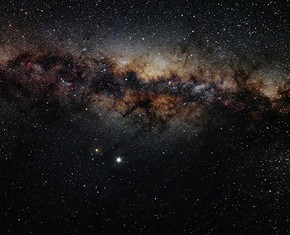The views expressed in our content reflect individual perspectives and do not represent the authoritative views of the Baha'i Faith.
If all of existence has a Prime Mover or a First Cause, as Aristotle believed, shouldn’t we be able to scientifically determine the origin of an observable order in the universe?
Theists—those who believe in a Supreme Being, as I do—often utilize this concept. However, in this final essay of the series, I want to take it in a direction I haven’t seen before.
When considering the origin of order and causation in our universe one is left with two choices, both of which lead one down a metaphysical path and ultimately to a form of theism:
- one can appeal to statistical physics via the idea of an eternal universe;
- or one can appeal to a physical “first-cause,” which theists tend to prefer.
The latter approach usually assumes a universe bounded at its inception and therefore probably finite. Traditional creationists often like to point to the second law of thermodynamics, interpreted to claim that order must be decreasing in the universe. So, they reason, if it were not for some initial source of order which they attribute to their favorite Creator, our universe should be in an entropic death spiral, not teeming with the beauty and order which we observe.
Modern cosmologists would refute this view by citing a recurring big bang and big crunch, or by appealing to quantum fluctuations of the vacuum as Lawrence Krauss does in his book A Universe from Nothing. Others argue for some sort of multi-verse, in which our universe comprises but one of an infinite number of bubble-like universes. However, all these possible scenarios require at the very least infinite time or eternity and possibly infinite space to account for the origin of order. The Baha’i teachings say it this way:
The power of God is eternal and there have always been beings to manifest it; that is why we say that the worlds of God are infinite—there has never been a time when they did not exist. One can bring nothing forth from nothing, in the same way that which exists is never destroyed; the apparent annihilation is merely transmutation. – Abdu’l-Baha, Divine Philosophy, p. 107.
So yes, quantum probabilities should bring about recurring and spontaneous symmetry breaking—provided the time or space scales are long enough.
But the implications of an infinite universe in time and space in relation to theism are rarely explored. From a physics perspective, the current evidence seems to favor the concept of an infinite universe, unbounded by space and time. This is due to the measured flatness of the universe, which is totally flat at least to the distances that humans have been able to measure. Thus, the shape of the universe which best fits this data would be an infinitely flat one—not one that curves back on itself.
The issue is, if the universe inhabits an infinite space or even infinite time as the current evidence suggests, and the rules of causation apply respectively, the sheer force of any sort of statistics operating over either of these infinities in time or space will surely make it explore all possible states, even the highly unlikely ones.
Could one of these states involve something with all the attributes we commonly ascribe to a deity? If we consider human consciousness as being created in the “image of God” as many of the great religious texts assert, then we can deduce several essential attributes for the Creator: creative power, love and knowledge to name just the basics.
The question then becomes, if given infinite time and space, could a configuration of consciousness come into existence—or already exist—possessed of sufficient creative power to bring a new universe into being? Could that creative consciousness love in an all-encompassing manner and have intelligent knowledge of all aspects of the cosmos? If such a being could ever exist, then by virtue of its nature it has always existed and will continue to do so:
All praise be unto God Who was Ever-Existent ere created things were called into being, when there was no one else besides Him. He is the One Who hath been Ever-Abiding while no element of His creation did yet exist. – The Bab, Selections from the Writings of the Bab, p. 195.
This of course involves extrapolating what we do know about the evolution of human consciousness. On our planet consciousness has emerged through a process taking about half a billion years. It has gone from life in single-celled beings to the simple perception of insects, to the maternal nurturing of birds and lower mammals, to social pack interaction in higher mammals, and, in humans, complex civilizations. Along the way the human capacities for creativity, knowledge and love have grown, reaching a current apex in our species.
Is it unreasonable to think this process can continue towards levels of knowledge, love and creativity unimaginable in the way that the human attributes of knowledge, love and creativity are unimaginable to insects? With that in mind, consider what an infinite universe might potentially yield. To me the answer seems obvious—though I cannot prove definitely that such a Supreme Being exists, the evidence based on extrapolation is very compelling.
As a Baha’i, I would claim that one doesn’t need to search the expanse of the universe to recognize that our Earth has already hosted individuals who manifested all these spiritual attributes. Examples abound: Christ, Abraham, Moses, Muhammed, Krishna, Buddha, Zoroaster and more recently the Bab and Baha’u’llah. Each of these founders of great Faiths manifested love, knowledge and immense spiritual power. They released creative forces in society on a level beyond ordinary human consciousness. Relative to them, ordinary human consciousness resembles that of a lower mammal—but each of those divine messengers calls us to the same purpose and goal:
If we want to improve the world we cannot do it with scientific knowledge but with ideals. Confucius, Buddha, Jesus and Gandhi have done more for humanity than science has done. We must begin with the heart of man—with his conscience—and the values of conscience can only be manifested by selfless service to mankind. …
Religion and science go together. As I’ve said before, science without religion is lame and religion without science is blind. They are interdependent and have a common goal—the search for truth. Hence it is absurd for religion to proscribe Galileo or Darwin or other scientists. And it is equally absurd when scientists say that there is no God. The real scientist has faith, which does not mean that he must subscribe to a creed. Without religion there is no charity. The soul given to each of us is moved by the same living spirit that moves the universe. – Albert Einstein, quoted by William Hermanns in Einstein and the Poet: In Search of the Cosmic Man pp. 92-94.
… religion is in harmony with science. The fundamental principles of the Prophets are scientific, but the forms and imitations which have appeared are opposed to science. If religion does not agree with science, it is superstition and ignorance; for God has endowed man with reason in order that he may perceive reality. The foundations of religion are reasonable. God has created us with intelligence to perceive them. If they are opposed to science and reason, how could they be believed and followed? – Abdu’l-Baha, The Promulgation of Universal Peace, p. 128
God, the Almighty, has created all mankind from the dust of earth. He has fashioned them all from the same elements; they are descended from the same race and live upon the same globe. He has created them to dwell beneath the one heaven. As members of the human family and His children He has endowed them with equal susceptibilities. He maintains, protects and is kind to all. He has made no distinction in mercies and graces among His children. With impartial love and wisdom He has sent forth His Prophets and divine teachings. His teachings are the means of establishing union and fellowship among mankind and awakening love and kindness in human hearts. He proclaims the oneness of the kingdom of humanity. He rebukes those things which create differences and destroy harmony; He commends and praises every means that will conduce to the solidarity of the human race. He encourages man in every step of advancement which leads to ultimate union. The Prophets of God have been inspired with the message of love and unity. The Books of God have been revealed for the upbuilding of fellowship and union. The Prophets of God have been the servants of reality; Their teachings constitute the science of reality. Reality is one; it does not admit plurality. We conclude, therefore, that the foundation of the religions of God is one foundation. – Ibid., p. 297.
To my thinking the very existence of those prophets validates the existence of a loving Creator.
















Comments
Sign in or create an account
Continue with Googleor